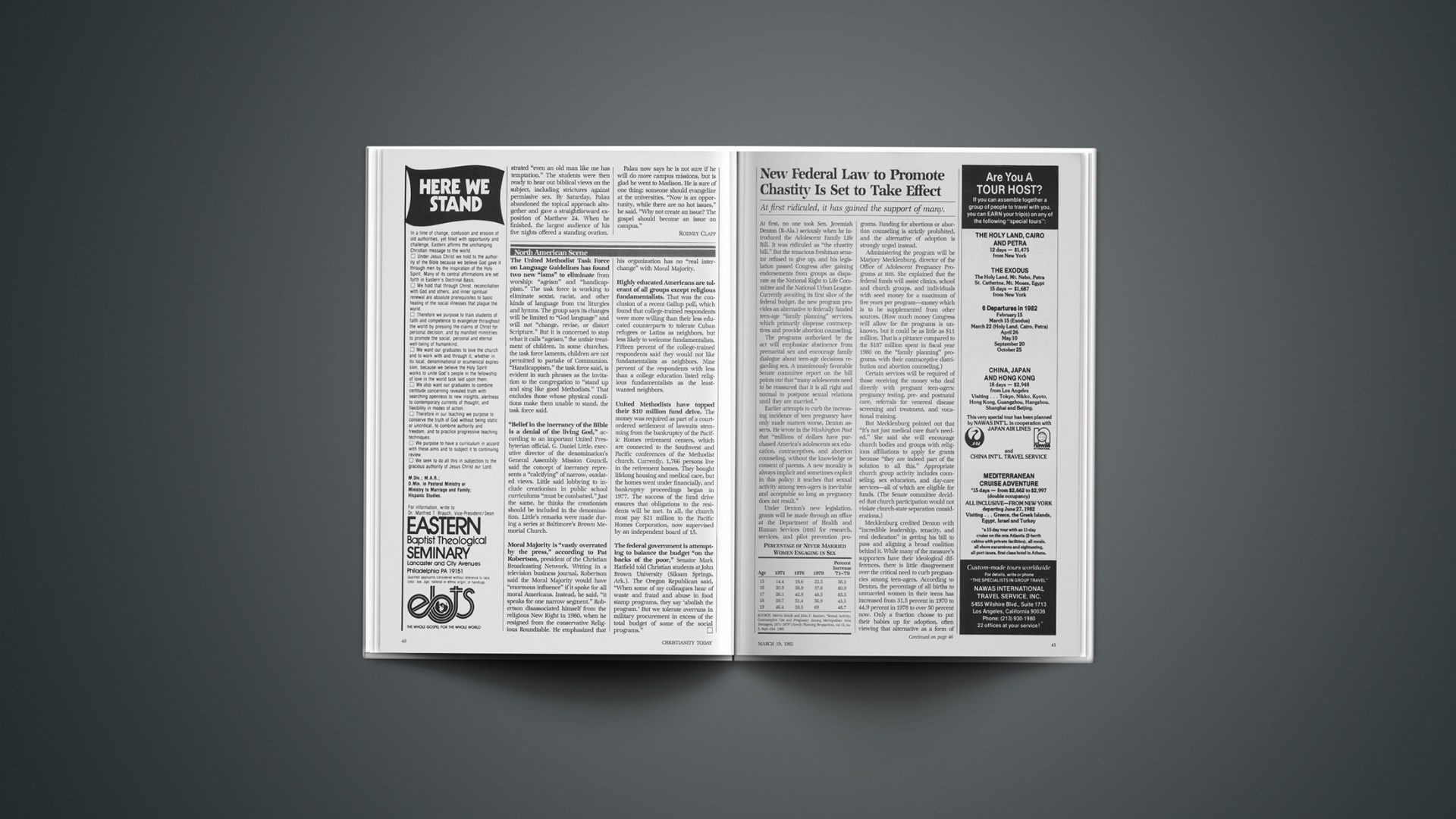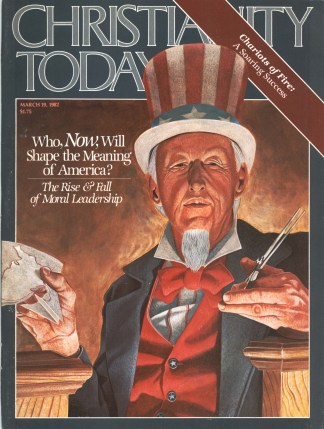At first ridiculed, it has gained the support of many.
At first, no one took Sen. Jeremiah Denton (R-Ala.) seriously when he introduced the Adolescent Family Life Bill. It was ridiculed as “the chastity bill.” But the tenacious freshman senator refused to give up, and his legislation passed Congress after gaining endorsements from groups as disparate as the National Right to Life Committee and the National Urban League. Currently awaiting its first slice of the federal budget, the new program provides an alternative to federally funded teen-age “family planning” services, which primarily dispense contraceptives and provide abortion counseling.
The programs authorized by the act will emphasize abstinence from premarital sex and encourage family dialogue about teen-age decisions regarding sex. A unanimously favorable Senate committee report on the bill points out that “many adolescents need to be reassured that it is all right and normal to postpone sexual relations until they are married.”
Earlier attempts to curb the increasing incidence of teen pregnancy have only made matters worse, Denton asserts. He wrote in the Washington Post that “millions of dollars have purchased America’s adolescents sex education, contraceptives, and abortion counseling, without the knowledge or consent of parents. A new morality is always implicit and sometimes explicit in this policy: it teaches that sexual activity among teen-agers is inevitable and acceptable so long as pregnancy does not result.”
Percentage Of Never Married Women Engaging In Sex
SOURCE: Melvin Zelnik and John F. Kantner, “Sexual Activity, Contraceptive Use and Pregnancy Among Metropolitan Area Teenagers, 1971–1979”; Family Planning Perspectives, vol 12, no. 5, Sept.–Oct. 1980
Under Denton’s new legislation, grants will be made through an office at the Department of Health and Human Services (HHS) for research, services, and pilot prevention programs. Funding for abortions or abortion counseling is strictly prohibited, and the alternative of adoption is strongly urged instead.
Administering the program will be Marjory Mecklenburg, director of the Office of Adolescent Pregnancy Programs at HHS. She explained that the federal funds will assist clinics, school and church groups, and individuals with seed money for a maximum of five years per program—money which is to be supplemented from other sources. (How much money Congress will allow for the programs is unknown, but it could be as little as $11 million. That is a pittance compared to the $187 million spent in fiscal year 1980 on the “family planning” programs, with their contraceptive distribution and abortion counseling.)
Certain services will be required of those receiving the money who deal directly with pregnant teen-agers: pregnancy testing, pre- and postnatal care, referrals for venereal disease screening and treatment, and vocational training.
But Mecklenburg pointed out that “it’s not just medical care that’s needed.” She said she will encourage church bodies and groups with religious affiliations to apply for grants because “they are indeed part of the solution to all this.” Appropriate church group activity includes counseling, sex education, and day-care services—all of which are eligible for funds. (The Senate committee decided that church participation would not violate church-state separation considerations.)
Mecklenburg credited Denton with “incredible leadership, tenacity, and real dedication” in getting his bill to pass and aligning a broad coalition behind it. While many of the measure’s supporters have their ideological differences, there is little disagreement over the critical need to curb pregnancies among teen-agers. According to Denton, the percentage of all births to unmarried women in their teens has increased from 31.5 percent in 1970 to 44.9 percent in 1978 to over 50 percent now. Only a fraction choose to put their babies up for adoption, often viewing that alternative as a form of punishment toward their child. More than half opt for abortion.
At appropriations hearings on February 3, Denton listed the supporters that stand behind the new approach, including the National Association of Evangelicals, National Conference of Catholic Bishops, American Life Lobby, March of Dimes, and the Kennedy Foundation. A staunch supporter, Eunice Kennedy Shriver, testified before Congress that “we do not need more money for the mechanics of birth control or more value-free sex education. We need efforts that strengthen the family commitment and marriage and get at the problems that lead adolescents into early sexual activity.”
Her brother, Sen. Edward M. Kennedy (D-Mass.), worked closely with Denton to arrive at the bill’s wording. In 1978, Kennedy set in motion the present law establishing teen pregnancy programs. A comprehensive approach was taken because, according to a Senate report, the “problem consists of several intertwined aspects: the moral issues of premarital teen-age sexual relations, abortion, and illegitimate births; questions concerning the well-being and prosperity of the resultant family; and public assistance and support of those teen-age families that are not self-sufficient.”
Kennedy supported Denton’s legislation partly because many of the programs begun under his initiative stand to lose their funding as the federal budget is cut. To preserve support in the predominantly conservative Senate, he was willing to go along with Denton’s new emphasis on preventing teen-age sexual relations.
Also, the weight of evidence indicates that the past approach simply has not worked. Critics say family planning centers help drive a wedge between adolescent and parent by keeping the teen’s contraception prescriptions and medical treatment confidential. On February 22, President Ronald Reagan proposed a regulation to reverse this policy. His regulation would require parental notification except in cases where child abuse is likely to result.
Denton’s committee report cited research showing that “premarital sex is less frequent when parents have discussed the issue with their children” and when values are shaped at home rather than by peer pressure.
Denton has defended his bill by saying it “does not accept the position that premarital adolescent sexual activity is inevitable. That particular argument is rooted in hopelessness.… Humankind is more than animal in nature.”
Denton, a Roman Catholic, has seven grown children and has been married 35 years. He attained national prominence when he returned from seven-and-a-half years in a North Vietnamese prison. The moral degeneration he observed upon his return spurred him to run for the U.S. Senate, where he serves as the first Republican from Alabama in more than 100 years.
One of his chief goals is to restore a sense of the sanctity of marriage in America, and he feels there is no better place to begin than with today’s adolescents.
Anglican-Catholic Accord Grows Closer
Nineteen eighty-two should be a watershed year in relations between the papacy and the worldwide Anglican church led by Robert Runcie, the archbishop of Canterbury.
In May, Pope John Paul II will visit England; his coming signals the increasing closeness of the two churches and follows a recent announcement that substantial agreement had been reached between them on the theology of the priesthood (this despite the papal bull, Apostolicae Curae, issued 84 years ago, in which Pope Leo XIII declared for all time that Anglican holy orders were absolutely null and void).
In an important parallel development in January, the British Foreign Office and the Vatican jointly announced the raising of diplomatic representation to ambassadorial level. (This diplomatic exchange also buries the centuries-old conflict between the papacy and the British monarchy that followed the excommunication of Queen Elizabeth I following the Reformation.)
The Anglo-Catholic wing of the Church of England greeted the establishing of full diplomatic relations with cautious favor, while the Protestant wing and the free churches expressed dismay.
Although the Pope’s tour of Britain is technically a pastoral visit to the nation’s Catholics, it is also a visit by a head of state, and the Pope will be accorded full ceremonial courtesies. Already there is mounting concern at the excessive splendor and cost of the visit, and the media are describing John Paul as a megastar.
The more partisan Protestants plan to demonstrate in London against the papal visit. Their protest is being coordinated by the Protestant Reformation Society, a mostly Anglican group, and by the United Protestant Council.
Attempting to delineate its stance between the extremist fringe and the ecumenical enthusiasts, the Evangelical Alliance urged its member denominations “not to engage in negative counterdemonstrations of the papal visit,” and “to treat those in the Roman Catholic church with love, respect, and courtesy.” At the same time it stressed that “there remain fundamental differences between biblical truth and the teaching of the Roman Catholic church which cannot be lightly dismissed in a mood of ecumenical euphoria.”










